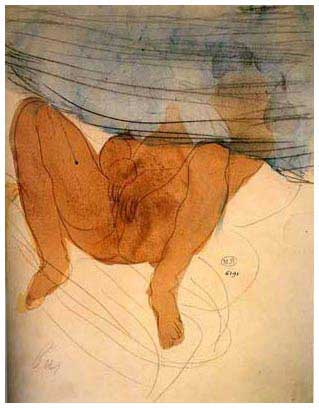|
Francois-Auguste-Rene Rodin 1840-1917. French
artist sculptor whose works are distinguished by their stunning strength
and realism. Rodin refused to ignore the negative aspects of humanity,
and his works confront distress and moral weakness as well as passion
and beauty.1
Rodin on Art and Artists
Art is contemplation. It is the pleasure of the mind
which searches into nature and which there divines the spirit by which
Nature herself is animated. It is the joy of the intellect which sees
clearly into the Universe and which recreates it, with conscientious
vision.
The only thing is to see. The artist sees;
that is to say, that his eye, grafted to his heart, reads deeply into
the bosom of Nature. I see all the truth, and not only that of the outside.
I accentuate the lines which best express the spiritual state that I
interpret.
Character is the essential truth of any natural object,
whether ugly or beautiful... There is nothing ugly in art except that
which is without character, that is to say, that which offers no outer
or inner truth. There is nothing in nature which has more character
than the human body. What we adore in the human body more even than
its beautiful form is the inner flame which seems to shine from within
and to illuminate it. There is really neither beautiful style, nor beautiful
drawing, nor beautiful color; there is but one sole beauty, that of
the truth which is revealed. Nature is always beautiful.
But, to speak truly, all is idea, all is symbol.
So the form and attitute of a human being reveal the emotions of its
soul. The body always expresses the spirtit whose envelope it is. And
for him who can see, the nude offers the richest meaning.
The artist, full of feeling, can imagine nothing
that is not endowed like himself. He suspects in nature a great consciousness
like his own. There is not a living organism, nor an inert object, not
a cloud in the sky, not a green shoot in the meadow, which does not
hold for him the secret of the great power hidden in all things.
The substance perishes, the flesh dies, but dreams
and desires are immortal.
True artists are the most religious of men. Religion
is more tham the mumbling of a creed. It is the meaning of all that
is unexplained and doubtless inexplicable in the world. It is the adoration
of the unknown force which maintains the universal laws and which preserves
the types of all beings; it is the surmise of all that in nature which
does not fall within the domain of sense, of all that immense realm
of things which neither the eyes of our body, nor even those of our
spirit can see; it is the impulse of our conscious towards the infinite,
towards eternity, towards unlimited knowledge and love - promises perhaps
illusory, but which in this life give wings to our thoughts. Everywhere
the great artist hears spirit answer to his spirit. Where, then, can
you find a more religious man?
Order reigns without doubt in the immensity of nature,
but it is much more complex than man in the first efforts of his reason
can represent it - and besides, it is eternally changing. Great works
of art, which are the highest proof of human intelligence and sincerity,
say all that can be said on man and on the world, and, besides, they
teach that there is something more that cannot be known.2
1 http://www.ibiblio.org/wm/paint/auth/rodin/
2 Exerpts from Rodin on Art and Artists Conversations with Paul
Gsell Translated by Mrs Romilly Fedden, 1983 Dover Publications,
Inc.
|




